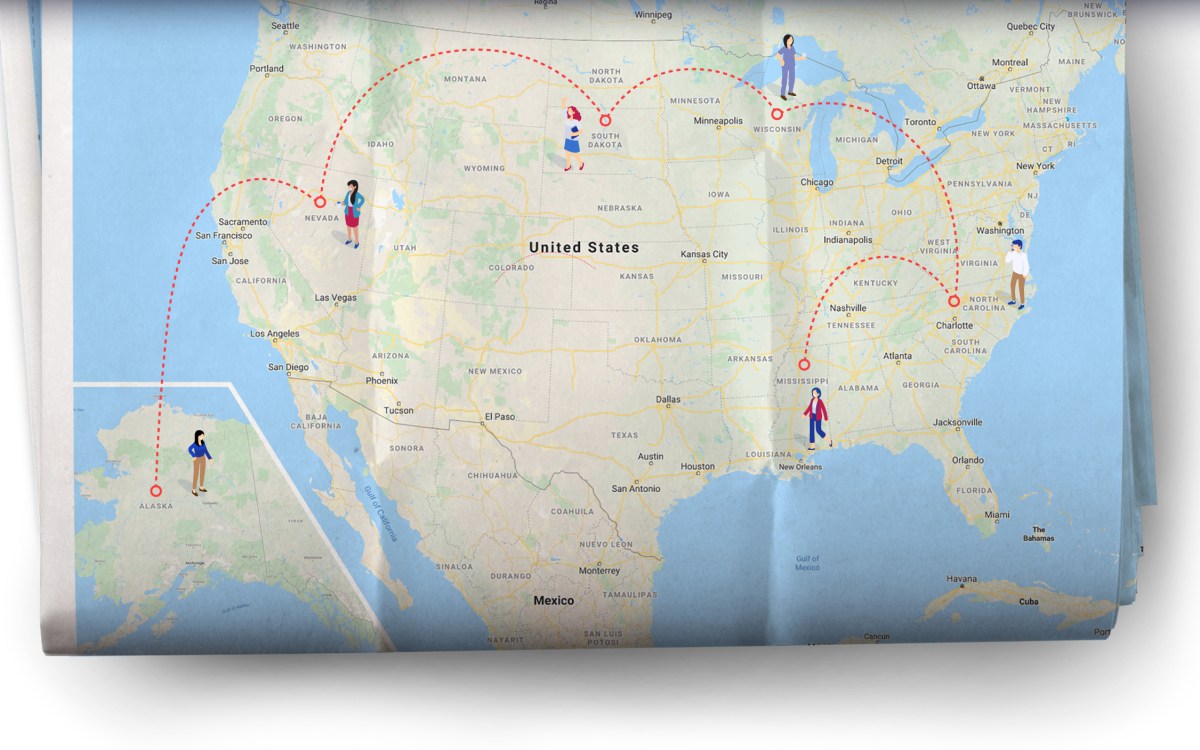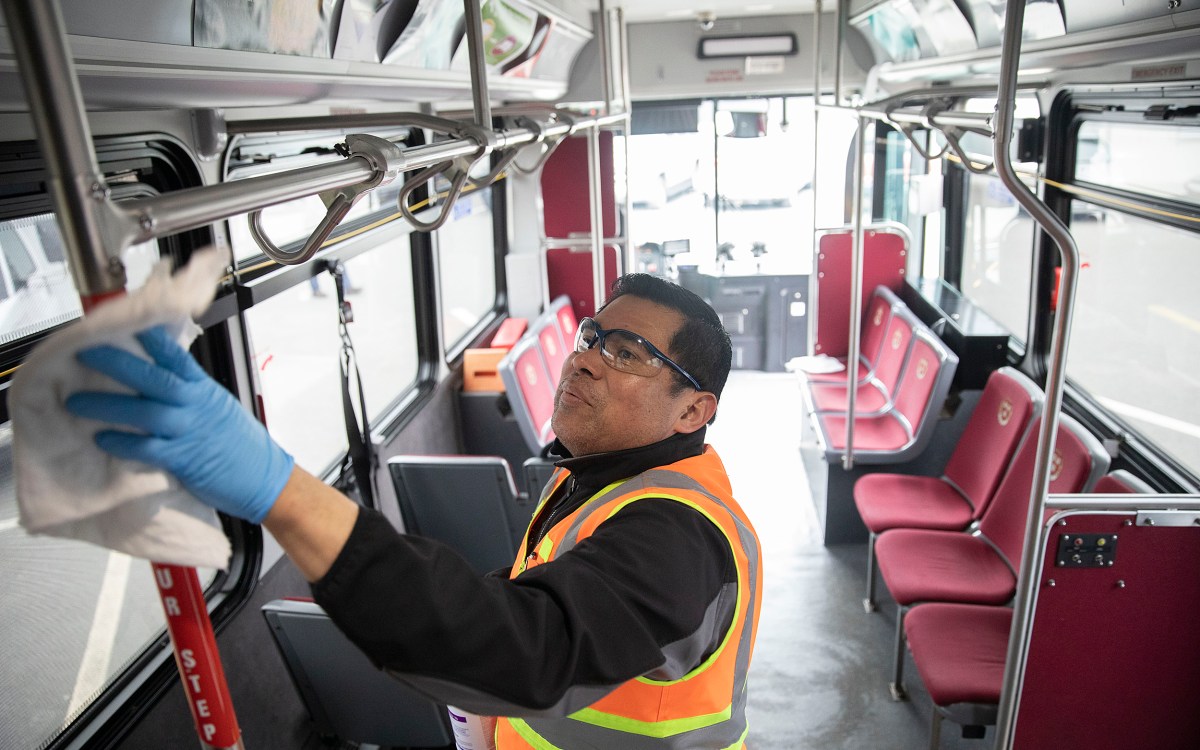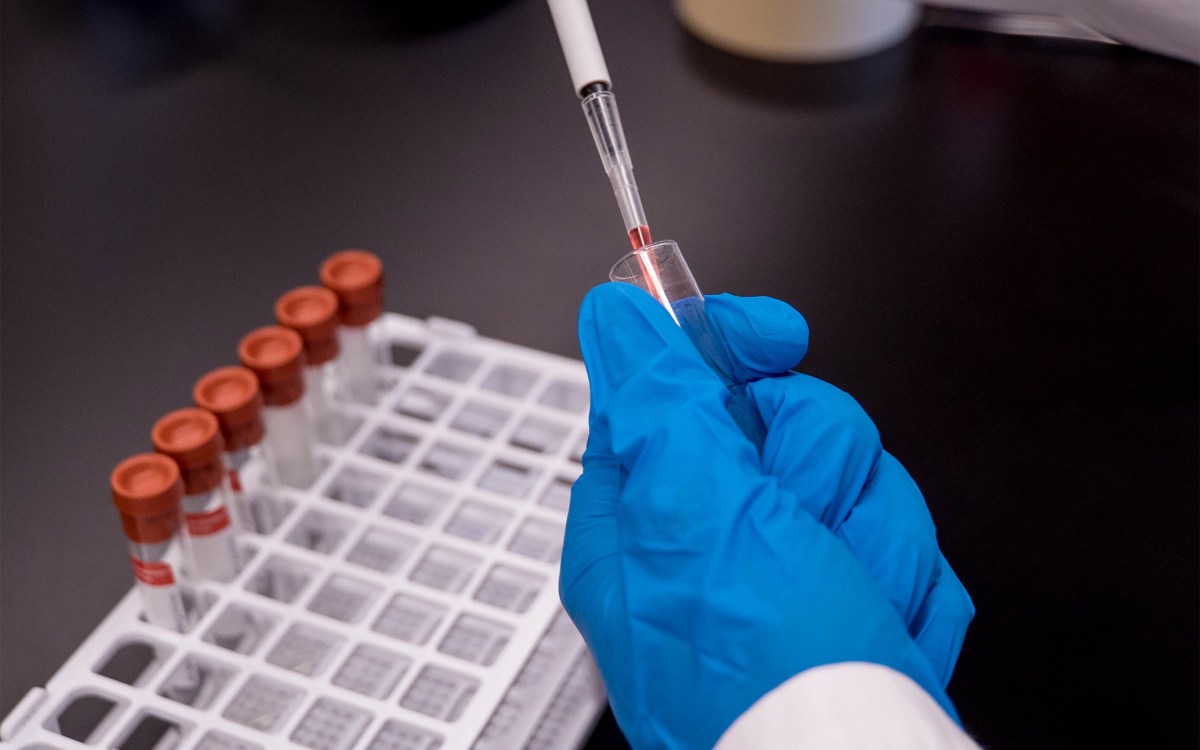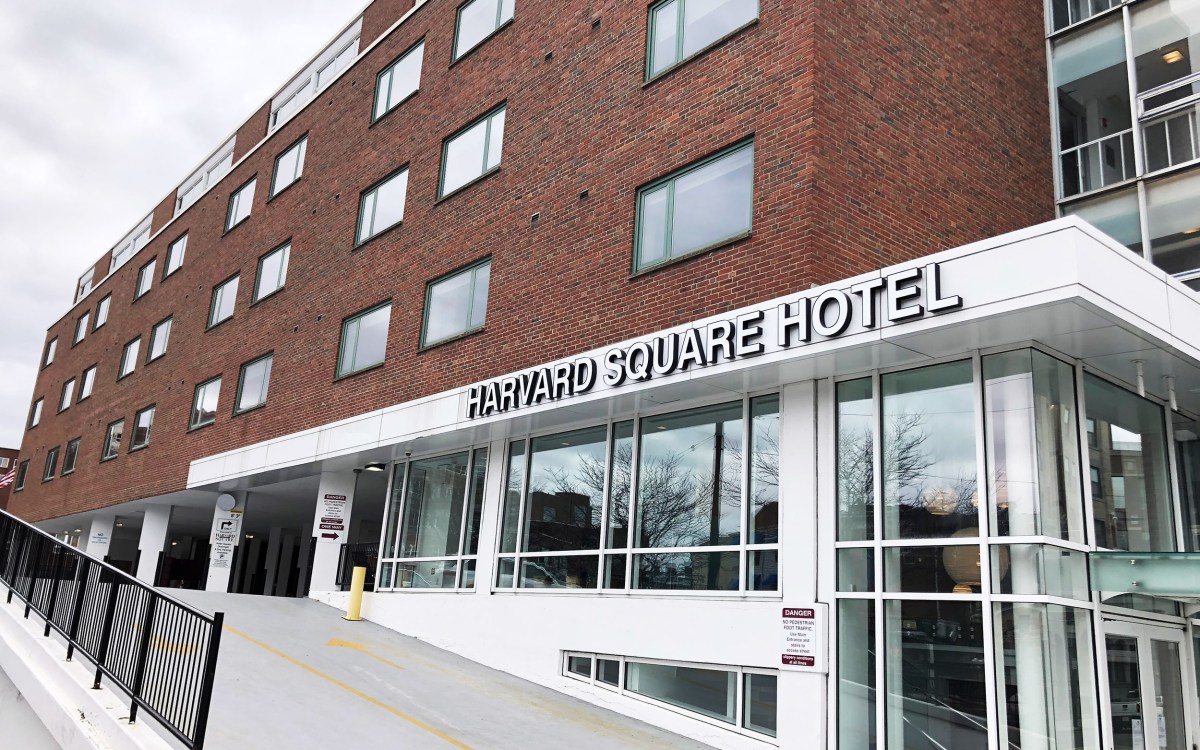Video: Kenneth Bacow
‘I thought: This is going to be interesting’
President Bacow, now recovered, shares own experience having COVID-19
Harvard President Larry Bacow announced in an email to the Harvard community on March 24 that he and his wife, Adele Fleet Bacow, had been exposed to the spreading coronavirus. More than a week after they began working from home and limiting their outside contacts, both started experiencing the symptoms of COVID-19. Now recovered, he shared their experience with the Gazette.
Q&A
Larry Bacow
GAZETTE: How are you and Adele feeling?
BACOW: We are feeling much better. We were very fortunate. We never experienced any of the respiratory problems that sent so many people to the hospital. For us, this felt a lot like the flu. Not fun, but certainly not life-threatening, at least in our case.
GAZETTE: What were your symptoms?
BACOW: We both started off with a cough and then that progressed to having a fever and chills. I also had whole-body muscle aches. Everything hurt. I felt like I was 120 years old almost overnight. And then lethargy — just how you feel when you have the flu.
GAZETTE: What was going through your mind when you learned you had both tested positive?
BACOW: Well, we’d been very, very careful, and I was a little bit surprised, in truth, because Adele and I had not seen anyone except each other for close to 10 days before we started experiencing symptoms. We were completely isolated in the house. One reason we had taken such precautions is because I live with an autoimmune condition that makes me very susceptible to any kind of infection. In fact, some people questioned why I actually got tested. It’s because I’m immunosuppressed. So I was at risk. And when we tested positive I thought, “This is going to be interesting.”
I was also worried about being able to discharge my responsibilities. When I was at Tufts, I had gotten quite ill in 2004 when my autoimmune condition was first diagnosed, and I had had to take a month off of work. I realized that I needed to look after my own health. I wasn’t good to anybody if I wasn’t healthy. But beyond that, I realized I also had to give others permission to take the time they needed to recover if they got sick. So when I tested positive, I tried to model the behavior I would hope to see in others by being a good patient and doing what I was supposed to do. And I’m fortunately blessed with a great team. They didn’t miss a beat and filled in behind me and just kept everything moving forward in my absence.
GAZETTE: Were you able to do any work at all, or were you off the grid entirely?
BACOW: As president, you are never completely off the grid. I was looking at email, although not terribly responsive to it. I would have one call a day with Patti Bellinger, my chief of staff, and with Bill Lee, senior fellow of the Corporation. And I would receive daily reports from both Katie Lapp, [executive vice president and chief administrative officer] and [Provost] Alan Garber. And if I needed to, I would talk to them by phone as well.
GAZETTE: What kind of response did you get when you let the Harvard community know in an email that you and Adele were sick?
BACOW: We must have received a thousand responses, from students, faculty, staff, and alumni, in some cases from all over the world. We were both quite touched by the response.
What was a little strange was lying in bed sick watching CNN, if I recall correctly, and having them report on me being sick. That was a bit of an out-of-body experience. Once it made the national news, we started hearing from old friends and family from around the country and around the world.
GAZETTE: What are you doing to keep yourself occupied during this social isolation? Have you been binge-watching anything or reading anything in particular?
BACOW: It’s a struggle just to keep up on email. I haven’t really had a chance to read anything for pleasure. In the irony department, our son and daughter-in-law and two granddaughters called us up a few weeks ago. They live in New York City. They were working remotely and wanted to know how we would feel if they came up and lived with us during this experience. We said, “Of course, we’d love to see you.” Well, they literally drove up here the day the two of us came down with our first symptoms. They have been in the house and we’ve been FaceTiming them and engaging in social distancing. The big distraction is having our 2½-year-old granddaughter and our now 8-week-old granddaughter with us. We hope as we emerge from the other side of this in a few days that we’ll actually be able to play with them. That will be our distraction.
GAZETTE: Now that you are feeling better, what is a typical day like for you working from home?
BACOW: Since I’m just recently recovered, I’m not sure I have a real routine yet. I have not started exercising again, but that is something I hope to do in the next week. I’m still trying to take it easy because I’m getting my strength back. So, for a typical day, the first thing I do is look at email that came in overnight. And then usually I have a series of phone calls and Zoom meetings, like everybody else. Sometimes those are calls with my direct reports. I’m checking in with the deans and the various vice presidents. I’m also talking to public officials. I’ve had phone calls with the governor, and officials in Cambridge, Boston, and in Washington, D.C.
I’ve also been talking to my presidential peers. The Ivy League presidents have been in close touch largely via email, and I have also spoken to a number of them by phone. I make a point of speaking to MIT President Rafael Reif regularly, and I have spoken to a number of other presidential colleagues in the area. I’ve also been in touch with [former Harvard presidents] Drew [Faust] and Larry Summers. So, I try to reach out to people who either have previously dealt with situations like what we’re dealing with now, or because they’re dealing with them in real time.
I’ve been on calls with the Association of Independent Colleges and Universities in Massachusetts, and the American Council on Education. Last weekend we had the governing boards meeting on Zoom. We had a full meeting of the Board of Overseers and a meeting of the Corporation.
“With spring break coming up we were concerned that if we did not act quickly our students would disperse and likely come into close proximity with other young people in various parts of the world, and that when they returned to campus we could face a full-blown outbreak here.”
GAZETTE: Looking backward, when did the University start monitoring the coronavirus?
BACOW: In early January, Harvard University Health Services started paying attention to what was going on in China. We have students from China, and we have a fair number of faculty and staff who travel to China for their own scholarship, so we started monitoring what was going on there. We also started issuing advisories to members of our community who were returning to campus from China on the steps they should take to ensure that they remained healthy. Then we started issuing advisories discouraging travel, first to China and then broadening that to other hotspots throughout the world as they became apparent.
We were very, very attentive to what was going on. We were also in close contact with the members of our own faculty and staff, some of whom are among the world’s foremost experts in infectious disease, virology, epidemiology, public health. And they themselves were in contact with their colleagues in China and in other parts of the world, and started advising us on the risks we were facing going forward. We very quickly started convening a crisis-management team to follow these events and to start doing some preliminary planning. Katie Lapp convened that team, which engaged the administrative deans, the vice presidents, and others from environmental health and safety throughout the University to start planning and thinking about what we might do if we saw this virus, both in the Boston area and especially if we saw it on our campus. Giang Nguyen, the director of Harvard University Health Services, also quickly put together a scientific advisory group. We have also been blessed to have Alan Garber, a physician as well as an economist, as our provost. Alan has published scholarly papers on the management of pandemics. So we drew upon a tremendous amount of expertise in trying to prepare for this virus and to make some intelligent decisions along the way.
GAZETTE: Harvard was one of the first institutions to de-densify its campus and transition to online learning, and there was some pushback at first. Can you talk about that decision-making process?
BACOW: Our thinking was driven almost entirely by a handful of considerations. One was just looking at the spread of the coronavirus, both in China and then in Italy and Spain, and trying to learn from the experiences of those countries. Second, it was driven by modeling, which we and others did, which suggested that, if this virus was as infectious as we thought it was and as dangerous as it appeared to be, we could face a very real crisis going forward. At that time, we believed that young people were less at risk than the elderly or those with pre-existing conditions. More recent data suggests, at least in the United States, that you’ve got a higher incidence of severe illness in young people than in some other countries. So we were looking at that. We were observing what was going on with a few cruise ships near Japan which function effectively as petri dishes and imagining what would happen if we got an infection in our dormitories where students live in close proximity to each other.
With spring break coming up, we were concerned that if we did not act quickly our students would disperse and likely come into close proximity with other young people in various parts of the world, and that when they returned to campus we could face a full-blown outbreak here. So we thought it was important to act before students went on spring break and we mobilized resources very quickly. Our Harvard University IT department under Anne Margulies [vice president and University chief information officer] quickly geared up to be able to get everybody on Zoom, to start educating faculty on Zoom, and to make sure that we had the IT infrastructure to sustain teaching in large numbers and having meetings on Zoom. Similarly, our vice provost for advances in learning, Bharat Anand, and his colleagues started to assemble resources to quickly educate faculty in online teaching. Each of the deans worked tirelessly with their faculty and staff to prepare. They are the real heroes of this process. And then we issued a notice to students that we were going to ask those who could move out to do so and not to return to campus after break, and that we were going to move all teaching online.
I knew that we would be criticized by some for possibly acting prematurely. But there was a point in this process where we watched the incidence of cases in Massachusetts over a four-day period go from, I believe, 13 to 28 to 42 to 91, which is clearly an exponential growth rate, albeit from a small base. It was a growth rate that had been repeated in almost precisely the same pattern in every other country that was a week or two ahead of us. So there were flashing red lights. And I quickly realized that the cost of being wrong was asymmetrical. What I mean by that is that if we acted prematurely, as some thought we were, then we would inconvenience many, and we would probably squander a lot of resources. But if we waited too long to respond, that cost was likely going to be measured in human life. And so the decision actually wasn’t that difficult. Implementing it was. But the decision to tell students to leave and to not return and to transition to online learning seemed pretty clear. We also recognized that by acting quickly we might make it easier for other institutions that were faced with similar decisions, but without access to the same expertise that we were blessed with, to act quickly as well.
GAZETTE: How do you feel the University went about supporting students and others in the transition?
BACOW: Obviously, we were asking a lot of students and others in our community to move so quickly, and people across the entire University pitched in to help. It was a mark of the strength of our community that individuals volunteered to assist students as they moved out. We also tried to provide financial support to help students with travel, storage, and other expenses. Staff in the College worked day and night, literally, to implement this decision and to address issues as they arose. They had thousands of questions to answer and problems to solve. Around 6,000 of our undergraduates moved out in five days or so.
We have had to quickly make a transition to online teaching and learning, and it’s also a transition for everybody working remotely from home, with very few exceptions. We’re so grateful for those members of our community who are looking after the students still in residence. We are really grateful to our employees who are continuing to make sure that our buildings are safe and secure. Everybody has been touched by this crisis. I’ve been really encouraged by the willingness of both our faculty as well as our students and all the people who are supporting them to, almost on a dime, master the technology necessary to teach online. There’s been so much goodwill on the part of people willing to learn new ways of teaching and learning.
GAZETTE: In your experience as Tufts president, is there anything you can compare this to?
BACOW: I lived through the 2008 financial crisis, and there are certainly some similarities between this crisis and that one, but also some important differences. The big similarity is that each one affected the economic environment in which we operate. And, in each case, we saw a decline in our endowments. In each case we are seeing a likely decline in philanthropy in the short-term and a decline in corporate and foundation support.
We will also see an increase in the demand for financial aid for our students. We’ve seen great anxiety among our employees, faculty, and staff, as well. And in each case we’ve also seen the community really respond positively, with people working hard to help out others less fortunate. That’s been very heartening.
This crisis is much harder than 2008 because it affects our ability to deliver on our core mission. We are a residential research University, and right now we basically cannot have students in residence. And the capacity of our faculty to deliver on our research mission is at the moment compromised because we’ve had to shut down our libraries and archives, and most of our laboratories and facilities that actually support our scholarly work, so there are challenges here that we never faced in 2008.
“I recognize that I’m not going to get everything right. But rather than try to do everything perfectly and be paralyzed by uncertainty, I think it’s important to be able to act, and act decisively.”
GAZETTE: Even amid those challenges, there are efforts happening across the University to address the pandemic. Can you speak to some of the collaborations and work happening with Harvard scholars and experts from around the world to try to tackle the coronavirus?
BACOW: One of the very first things we did, well before it was clear that the coronavirus was going to be this extraordinary crisis for our nation, was to develop a collaboration with our colleagues at the Guangzhou Institute of Respiratory Health. This is a major scholarly collaboration based at Harvard Medical School and run by Dean George Daley that engages all of our teaching hospitals, along with the Harvard T.H. Chan School of Public Health, the Faculty of Arts and Sciences, faculty in other parts of the University, and our colleagues at MIT, BU, the Broad, and the Ragon Institute. It also engages people in the life sciences industry here in Massachusetts. Harvard is at the center of this activity, focusing on developing rapid diagnostic tests, which are critical for how we manage this crisis going forward, and new vaccines and therapies. I’m incredibly proud of the way that our faculty, our graduate students, our research staff, our colleagues in industry and in the hospitals have all come together so quickly to focus all of the resources that Harvard and its neighbors can muster to try to address the challenges created by COVID-19.
More like this
GAZETTE: What has Harvard’s engagement with Cambridge, Boston, and the state been like through this process?
BACOW: We’ve been working with the city of Cambridge, the city of Boston, and the state to try to be helpful in a variety of ways. A number of our individual Schools, for example, tried to make resources available to assist in homeschooling. I can’t say enough good things about what our Graduate School of Education has done in this area. We also made the Harvard Square Hotel available to first responders and health care workers who may not be able to travel easily back and forth to their homes, in part because they fear infecting their own families. And we have made additional facilities available in Boston and Cambridge for the same purpose. We’ve collected personal protective equipment from our laboratories and made it available to area hospitals for health care workers who are still trying to take care of sick people in an environment in which personal protective equipment has proven scarce.
There was a recent article in the Harvard Gazette that details the variety of other ways that we have been trying to work with the state and our local communities.
Our alumni around the world have also been terrific in offering their assistance. We’ve had a number of them help to arrange shipments of personal protective equipment from different countries that’s now being distributed and made available through the governor’s good efforts to ensure that the supplies go to where they’re needed most.
GAZETTE: With the economy in such disarray, how are you thinking about the endowment and future payouts?
BACOW: We are looking at literally every expenditure within the University. The deans and the vice presidents are all working with us at the moment to limit spending and to ensure that that we are coming into alignment with what we know are going to be diminished sources of revenue. We’ve already spent a lot of money that we would not have otherwise in helping students go home. We are rebating room and board for students throughout the University. We have seen a decline in continuing and executive education revenues — a precipitous drop. So the immediate effects are significant already. And then we’ll see what the market delivers to us in endowment returns going forward.
The good news is that we anticipated that at some point we would face a recession. We were cognizant of the fact that we were already in the longest peacetime economic expansion in history. Several years ago, we began planning for the next recession. We didn’t know when it would come, but we knew that it would arrive at some point, and so we created a recession playbook, produced by our financial planning staff under (chief financial officer and Vice President of Finance) Tom Hollister’s guidance, with the participation of all of Harvard’s deans and vice presidents. We also tried to make sure that we understood the lessons of 2008 so that we could be better prepared the next time around. We took measures to ensure that we had more liquidity than we had going into 2008. We built reserves. All these things will help cushion the impact, but the impact will still be felt. The city of Cambridge and the city of Boston have already put restrictions on construction projects right now, so construction on the campus is on hold at the moment. Lots of things are going to be delayed, and there will be belt-tightening across the board.
GAZETTE: Challenging times demand tough decisions. What is it like, as the leader of Harvard, to have to make such difficult calls? Are there examples from history that you draw on?
BACOW: This is a time when I actually think it’s helpful to have been through some things like this before. At one point during my 10 years at Tufts, I made up a list of about a dozen crises of different sorts that I had to deal with, ranging from 9/11, which occurred 10 days into my presidency, to a major power failure in Medford that forced us to operate the university for eight days without any electricity, to the financial crisis of 2008, to getting sick myself in 2004 and being hospitalized multiple times in a six-month period.
I think having been through all that gives me some perspective. I sometimes say that one of the challenging things about being a university president is that all the easy decisions get decided before they get to you. That means that almost every decision I get to make is a 51/49 decision — if I’m lucky. Sometimes it’s 50.0001 versus 49.9999. The no-brainers have all been decided previously. So I’m used to having to make tough calls.
It helps to have been through challenging circumstances in the past. I’m also blessed with fabulous colleagues who help me understand the consequences of different choices. And then, like any other person, I just try to do the best that I can do. I recognize that I’m not going to get everything right. But rather than try to do everything perfectly and be paralyzed by uncertainty, I think it’s important to be able to act, and act decisively. And when you need to engage in error correction, to do that quickly as well.
GAZETTE: What are the implications for higher education as a result of the pandemic? Are there any silver linings?
BACOW: Even the darkest clouds have their silver linings. We’ve seen a lot of wonderful work on behalf of so many people from across the University trying to help others less fortunate. These efforts don’t surprise me, but it’s still wonderful to see. We’ve also seen both faculty and students experiment with new ways of teaching and learning, which I suspect will have long-term consequences for us. I suspect many of us have realized that we don’t need to travel nearly as much as we once did to attend meetings. Many of those meetings can now be held using technology — that will help us reduce costs and also reduce our carbon footprint. I also think we have realized people are immensely flexible. And while we all miss the social environment of being together and working together, people are still finding ways to be very, very productive from home. As we look forward, I hope we can build more flexibility into how people work at Harvard. That’s going to have long-term benefits as we think about how we organize work, not just within the University, but throughout society.
I also think some of the relationships that have been forged between institutions that are collaborating now to address the challenges posed by the coronavirus will prove durable as well. I just look at how we’re working with some of our colleagues in China right now, not just at Guangzhou Institute of Respiratory Health, but at other Chinese universities. I suspect we’ll build off those relationships going forward. So I think that there are going to be many positive benefits. That said, I wouldn’t wish this on my worst enemy.
GAZETTE: Is there a message you’d like to convey to the Harvard community, recognizing that the full impact of the crisis is yet to be felt?
BACOW: First of all, I would thank people for their patience and for their flexibility in adapting to circumstances that none of us have ever lived through. I would also ask people to give everyone the benefit of the doubt. So many people are working so hard right now across the University, working nonstop trying to address a dizzying array of questions, of uncertainties, and we know it’s inevitable that we’re not going to get everything right. We haven’t gotten everything right today. But people have worked really, really hard to adapt and to adapt quickly in the face of new information. I would hope that people would trust their colleagues and trust that the institution is going to do the best it can possibly do. And I would hope they know that when we make mistakes, we’re going to try to correct them as quickly as possible. And then we’re going to try to take on yet another new set of challenges, because the challenges are not going to go away. They’re going to be with us for some time to come.









